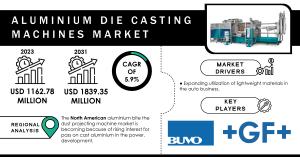Aluminium Die Casting Machines Market Will Reach at USD 1839.35 Million by 2031 With CAGR of 5.9%
Forging the Future: A Deep Dive into the Aluminium Die Casting Machines Market
TEXES, AUSTIN, UNITED STATES, June 7, 2024 /EINPresswire.com/ -- In 2023, the Aluminum Die Casting Market Size was valued at USD 1162.78 million. It is projected to grow at a CAGR of 5.9% from 2024 to 2031, reaching USD 1839.35 million by 2031.Download Sample Copy of Report: https://www.snsinsider.com/sample-request/2581
Top Key Players:
Alcast Technologies
BUVO Castings
Chongqing CHAL Precision Aluminium Co., Ltd.
Consolidated Metco, Inc.
Endurance Technologies Limited
FAIST Group
GF Casting Solutions
GIBBS
MartinreaHonsel Germany GmbH
Madison-Kipp Corporation
Ryobi Limited
The automotive industry, a dominant consumer over 64.8% share in 2023, is driving the market due to the rising demand for lightweight vehicles.
This translates to a need for aluminum cast parts for improved fuel efficiency, contributing to a projected growth exceeding the overall market. Additionally, the increasing adoption of high-pressure die casting, facilitated by technological advancements, allows for the production of complex parts with greater precision. This provides to the growing needs of the consumer durables sector and the 3C industry computing, communication, and consumer electronics.
High upfront costs for die casting machines act as a barrier to entry, especially for smaller manufacturers.
A single machine can range from $50,000 to upwards of $1 million, according to SNS Insider analysis. This, coupled with the additional cost of custom-designed dies for each part, makes die casting a less attractive option for low-volume or rapidly changing designs. Finally, the energy-intensive nature of aluminum die casting raises environmental concerns. The process consumes significant electricity and generates waste products, putting pressure on manufacturers to comply with stricter regulations and consumer demands for sustainable practices.
The growing emphasis on sustainable manufacturing practices creates a gap for energy-efficient die casting machines.
Aluminum die casting is already considered an energy-efficient metal forming process, but advancements in machine design and automation can significantly reduce energy consumption. This focus on sustainability presents an opportunity for manufacturers to develop and promote eco-friendly die casting machines, providing to environmentally conscious industries like aerospace and consumer electronics. By capitalizing on these niche sectors with high-growth potential, the Aluminum Die Casting Machines market can unlock significant untapped opportunities.
The aluminum die casting machine market provides to a diverse range of industries, with transportation leading the pack.
This segment, encompassing automobiles, aerospace, and other vehicle production, accounts for over 60% of the market share. The demand for lightweight, fuel-efficient vehicles fuels this dominance, as aluminum die casting allows for complex, high-strength parts that contribute to better mileage. Industrial applications, including machinery components and electronics enclosures, follow closely behind at around 20% share.
The Asia-Pacific region dominates in the Aluminum Die Casting Machines Market, holding over 50% of the market share.
The region holds a booming automotive industry, a key consumer of aluminum die-cast parts for components seeking lightweight and fuel-efficient solutions. China, India, and South Korea spearhead this growth, with rising disposable incomes and increasing urbanization driving demand for personal vehicles. Second, widespread industrialization across the region creates a fertile ground for die-cast applications in various sectors like consumer electronics (3C) and home appliances. Government initiatives promoting infrastructure development and manufacturing further amplify this effect.
Buy Complete Report: https://www.snsinsider.com/checkout/2581
Competitive Landscape:
Multinational giants like Bühler (Switzerland), Buhler Druckguss (Germany), and Toshiba Machine (Japan) hold a significant share due to their extensive product portfolios, global reach, and strong brand recognition.
However, regional powerhouses like LK Machinery (China) and Yizumi (China) are making inroads with competitive pricing and a focus on niche applications. This intensifies competition, particularly in price-sensitive markets. Furthermore, the landscape is diversified by specialization.
Companies like Frech (Germany) and Dimer Group (Italy) cater to the high-pressure die casting segment, while others like Sachs (Germany) specialize in cold-chamber die casting machines.
Key Takeaways:
The rising demand for lightweight materials, particularly in the automotive industry. Stringent emission regulations and a focus on fuel efficiency are pushing manufacturers towards aluminum, which offers significant weight reduction compared to traditional steel.
This is reflected in the growing popularity of high-pressure die casting (HPDC) techniques, which are well-suited for producing complex, high-precision aluminum parts for vehicles.
The expanding consumer goods sector is another area driving market growth. Aluminum die casting machines are instrumental in manufacturing a wide array of consumer products, from household appliances and power tools to sporting goods and furniture.
Akash Anand
SNS Insider | Strategy and Stats
+1 415-230-0044
email us here
Visit us on social media:
Facebook
Twitter
LinkedIn
Instagram
YouTube
Legal Disclaimer:
EIN Presswire provides this news content "as is" without warranty of any kind. We do not accept any responsibility or liability for the accuracy, content, images, videos, licenses, completeness, legality, or reliability of the information contained in this article. If you have any complaints or copyright issues related to this article, kindly contact the author above.

